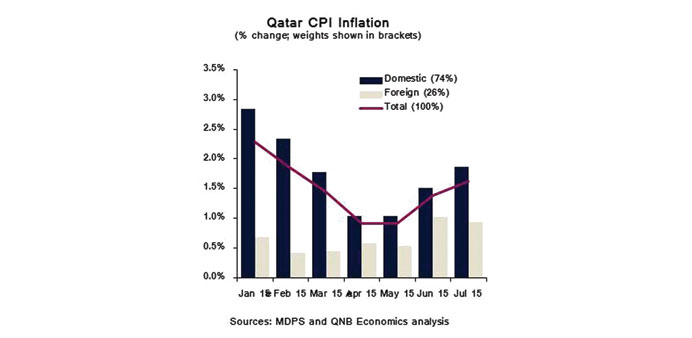Qatar’s overall inflation is set to bottom out this year, before picking up in 2016-17, QNB has said in a forecast.
Qatar’s consumer price index (CPI) inflation remained moderate in the first seven months of 2015.
According to the Ministry of Development Planning and Statistics (MDPS), CPI inflation is estimated to have averaged 1.5% in the year to July compared with 3.1% in 2014.
Inflation has been lower this year mainly due to lower domestic inflation as a result of falling rents as well as lower foreign inflation owing to declining international food prices.
Going forward, QNB forecasts overall inflation to bottom out this year, before picking up in 2016-17.
Foreign inflation has been lower this year as global food prices have been on a gradual declining path since their peak in the summer of 2012.
Prices in the other components of foreign inflation (clothing and footwear, furnishings and household equipment) also remained weak in the first seven months of 2015. Weak international commodity prices are likely to keep foreign inflation in check for the remainder of 2015.
Looking ahead, QNB forecasts overall inflation to increase slightly in 2016-17 as population growth is expected to pick up. Domestic inflationary pressures have been weak despite strong population growth. This is mainly because housing inflation (21.9% weight in the CPI) slowed. Inflation in this component, which mainly consists of rents, slowed from an estimated 4.6% year-on-year in January to 2.3% in July, despite strong population growth. Strong supply of additional housing units might be driving down rental costs.
More supply of low-to-middle-income housing is probably coming onto the market, which is meeting the bulk of the demand from expatriates. Furthermore, transportation inflation (14.6% weight in the CPI basket) slowed to 3.2% year-on-year in July from an estimated 7.6% year-on-year in January 2015.
In June and July, inflation picked up slightly owing primarily to the rebound in food prices due to seasonal Ramadan effects. Food prices in Qatar tend to increase every year during Ramadan and food inflation is therefore likely to moderate during the remainder of 2015, QNB said.
In addition, a lower decline in recreation and culture prices (12.7% weight in the CPI basket) also led to a rise in inflation during June and July. Having declined 6.5% in the 12 months to May, the recreation and culture component (which includes expenditures incurred abroad in respect of transport, travel and tourism) only declined 2.8% in the 12 months to July.
The strong US dollar is another factor likely to keep inflation down for the remainder of the year. The trade weighted index for the US dollar, to which the Qatari riyal is pegged, has appreciated 19.5% in the 12 months to end-July. The US dollar is projected to appreciate further with the expected tightening of US monetary policy. This would render imports of goods and services in other currencies cheaper, keeping down prices for final and intermediate products and lowering inflation in Qatar.
Qatar’s inflation, QNB said continued to remain subdued in the first seven months of increase aggregate demand, driving domestic inflation higher. Furthermore, a recovery is expected in international food and oil prices in 2016-17, which should lead to higher foreign inflation.

